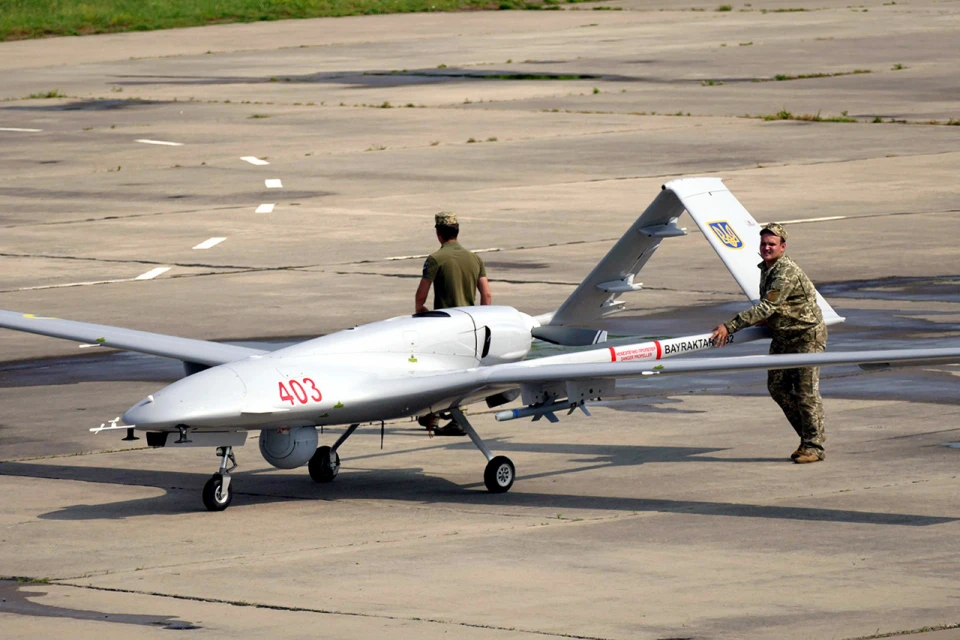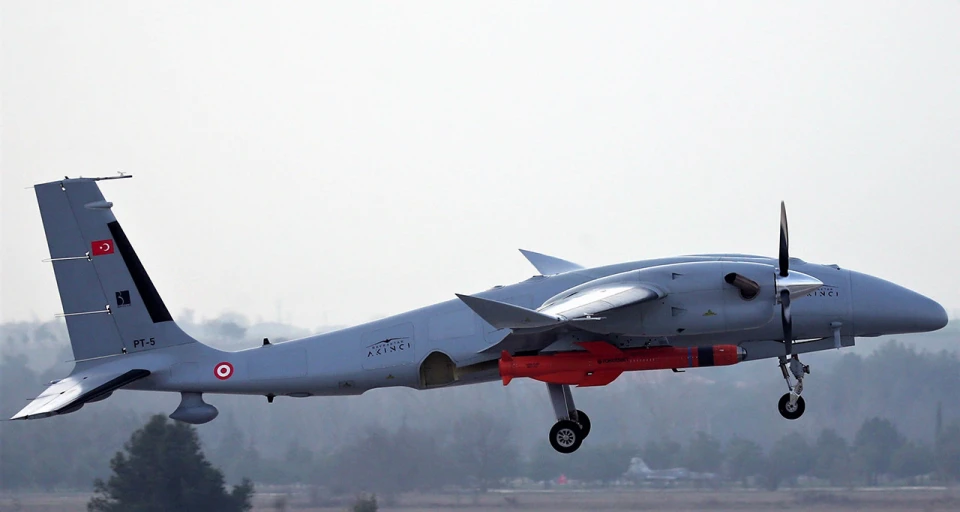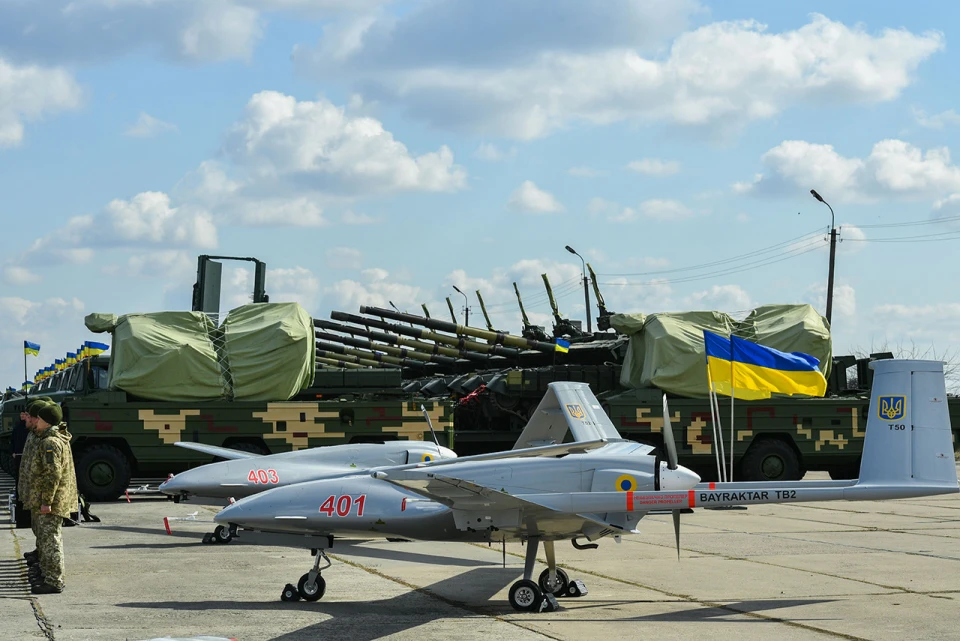
Ukraine's Baykar factory: production plans for Bayraktar drones
Turkish Bayraktar drones, symbols of Ukrainian resistance, are soon to be manufactured in Ukraine, symbolizing deeper ties
The text covers the following:
- Bayraktar in Ukraine
- What is Bayraktar and what are its features
- What will the Baykar plant in Ukraine look like
- When will there be a Bayraktar plant in Ukraine
Bayraktar in Ukraine

Photo: Getty Images
The first six units Ukraine purchased from Turkey in 2018. The following year saw the training of Ukrainian military personnel, who were instructed in both the theory and practical skills necessary to operate the system.
Bayraktars were put on combat duty in Ukraine in the spring of 2021. The drones were used mainly for reconnaissance and patrolling. The first combat use was in October 2021. The Bayraktar destroyed a Russian howitzer that was firing at Ukrainian army positions in violation of the agreements. Interestingly, two days after the incident, Russia banned the import of tangerines from Turkey.
At the beginning of the full-scale Russian invasion of Ukraine, Ukrainian defenders had approximately 20 Bayraktars ready to carry out combat tasks. Although military observers were skeptical of the drones' effectiveness against Russian air defenses, the course of the fighting, particularly when facing large columns of Russian vehicles in open terrain, contributed to the effective use of Turkish UAVs. British military expert David Hambling was impressed by the results shown by the Bayraktar TB2 in combat against Russian troops. He emphasized that the Bayraktars appeared to be the optimal solution in terms of efficiency-to-cost ratio. With a price tag within $6 million, they performed functions ten times more expensive than aircraft would.
During the first week of the major war, Bayraktars destroyed a column of military vehicles in the Kherson region, and in early March, they decimated a large amount of equipment in the Sumy region. It was the Bayraktar that diverted the attention of the air defense systems of the Russian cruiser Moskva before it was struck by Ukrainian Neptune missiles.
In the first four months after the full-scale invasion, the Ukrainian Armed Forces received up to 50 Bayraktar TB2 strike-reconnaissance drones from the Turkish company Baykar, as then-Defense Minister Oleksiy Reznikov disclosed. Regarding the use of Bayraktars by the Ukrainian Armed Forces, even the Russians complained to the Turkish government. They were told that Baykar Technologies is a private company.
What is Bayraktar and what are its features

Photo: Getty Images
The Bayraktar is a medium-altitude long-endurance unmanned aerial vehicle (UAV) designed for strike and reconnaissance missions, introduced into service in 2014. It is capable of both autonomous (up to 27 hours) and remotely controlled flights, with extended endurance. In favorable wind conditions, the Bayraktar can hover in place.
In Ukraine, the Ukrainian Defense Forces most actively utilize the Bayraktar TB2 drone. This unmanned aerial vehicle, resembling a small aircraft (length 6.5m, wingspan 12m), is equipped with an internal combustion engine with a two-blade propeller. Each Bayraktar TB2 system consists of 6 aircraft, 2 ground control stations, 3 ground data terminals, 2 remote video terminals, and ground support equipment.
The ground control station is transported by vehicle. These stations are capable of intercepting control of drones from one another, allowing for rapid changes in tactics. Therefore, when discussing the communication radius with the control center (150-300 km, depending on the version), it is measured not from the launch site, but from the nearest control station.
The maximum takeoff weight of the Bayraktar TB2 is 650 kg, with a payload capacity of 150 kg. The drone can accelerate to 222 km/h, although its cruising speed is 130 km/h.
What will the Baykar plant in Ukraine look like
In March 2022, Baykar unveiled the new Bayraktar MIUS with a Ukrainian AI-25 engine. Earlier, the company's website announced the first prototype of the new drone. The National Unmanned Combat Aerial Vehicle System (MIUS) was named Kızılelma ("red apple"). Its prototype was presented in August 2022, and in September, it underwent its first tests.
The project to open a factory in Ukraine, the manufacturer asserts, was conceived even before the large-scale invasion by Russia. However, the plans remained unchanged, and in the summer of 2022, Baykar established a company in Ukraine and acquired a plot of land to build a factory for producing Bayraktar drones. Ukrainian Ambassador to Turkey Vasyl Bodnar emphasized that this decision was not only political but also practical, as a significant portion of the components used in the factory's production will be of Ukrainian origin.
After meeting with President Volodymyr Zelenskyy, Baykar CEO Haluk Bayraktar spoke about the Baykar center in Ukraine, spanning over 30,000 square meters.

Photo: defence-ua.com
Additionally, timelines were provided. Haluk Bayraktar reported that the company already had a completed architectural project at the time and was commencing construction. Bayraktar anticipated that the company would finish it within two years.
When will there be a Bayraktar plant in Ukraine
In July 2023, Ukraine's Minister for Strategic Industries, Oleksandr Kamyshin, announced that the Turkish company Baykar had already commenced construction of a factory for producing unmanned aerial vehicles in Ukraine.
"This concerns the production within the territory of Ukraine, the same large factory for Bayraktars that was negotiated several years ago, then there were delays, then scandals. Today, this plant is being built, and we have moved on to real steps," Kamyshin argued during the United News telethon broadcast.
The completion dates, however, have shifted. If previously it was mentioned for the second half of 2024, now it is set for 2025. In February, Baykar indicated that they would need an additional 12 months to complete the work.
Despite this, the scale has also increased. If last year the Turks talked about 300 employees, now the executive director of the Turkish company Baykar says that the plant will employ 500 people.
As for the capacities, the Ukrainian plant plans to produce about 120 drones per year. In total, the Turkish company intends to invest $100 million in Ukraine. These funds will go towards three projects - the plant itself, a service center, and the main office.
"Baykar Makina, with state support, is not afraid to invest in the enterprise and is deploying it directly on the territory of our country. They are confident in the implementation of this project, where about 500 employees will work. It is likely that drones will be manufactured at a sufficiently rapid pace, with production rates of up to 10 Bayraktar TB2 or even Bayraktar TB3 drones per month in Ukraine," noted Defense Express expert Valerii Riabykh on Espreso channel.
It is also important that other arms manufacturers have decided to adopt the experience of the Baykar company. Thus, three French companies will immediately produce weapons in Ukraine, announced the Minister of Defense of France, Sébastien Lecornu. This includes KNDS, which manufactures 155mm shells and the Caesar self-propelled artillery unit, as well as the drone manufacturer Delair and the company Arquus (armored vehicles and ground equipment). Additionally, the German concern Rheinmetall has announced plans to build at least 4 weapons production plants in Ukraine, including factories for ammunition, military equipment, gunpowder, and anti-aircraft weapons.
- News











































